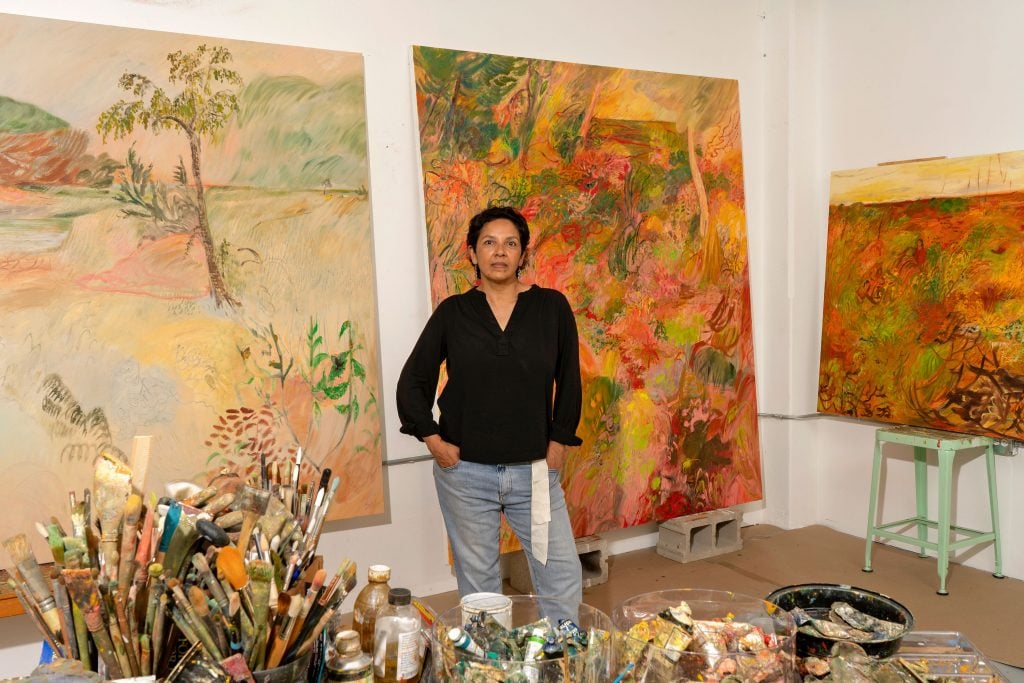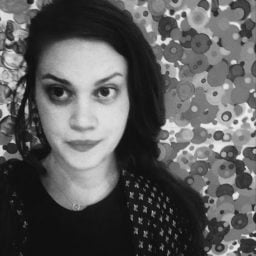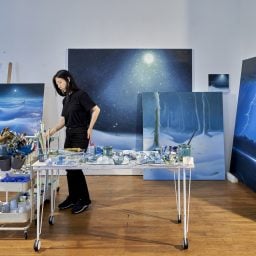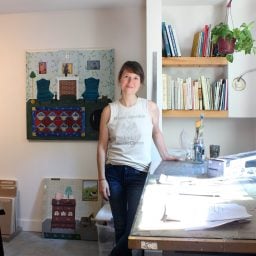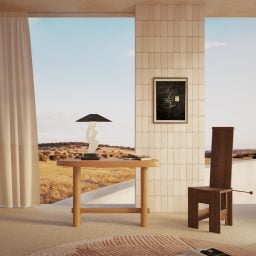Chicago artist Soumya Netrabile paints in flickers.
In her canvases, energetic and convulsive passages of greens, pinks, reds, and yellows turn into scenes of wildly grown backyards, clusters of flowers, the knotty branches of trees. Netrabile, who keeps a studio in what was once the city’s historic Hammond Organ Company plant, works intuitively, finding inspiration in lines of poetry and the arching drama of her favorite opera, which imbue her scenes with a passionate lyricism. For the Bangalore-born artist, these paintings are reflections of a state of reverie reached on daily walks, wandering through the woods near her home and daydreaming, as sunlight dapples the ground.
For the past year, Netrabile has spent her days in her studio—which is housed in a multi-disciplinary makers’ space alongside a candle-maker and a rooftop gardener—preparing for her solo show “Between Past and Present/Between Appearance and Memory” at Anat Ebgi in Los Angeles which opens later this week (September 16–October 21, 2023). Among the highlights of the exhibition is a nearly 30-foot continuous drawing that will be displayed flat on a table.
A self-proclaimed messy painter, Netrabile recently gave us a peek into her studio and the work that occupies her mind even long after leaving.
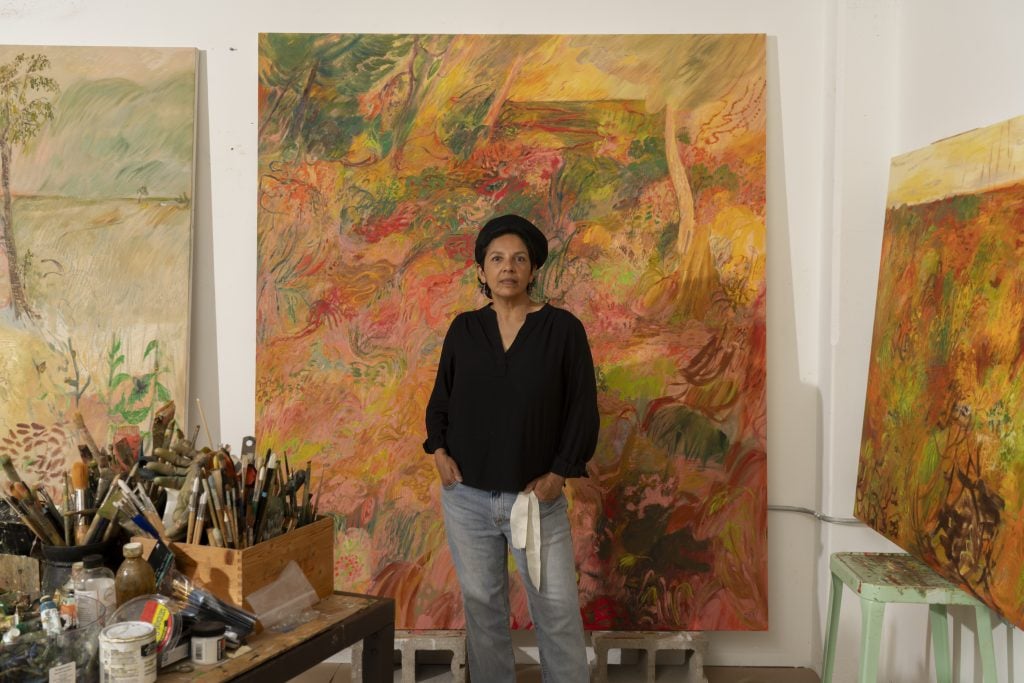
Soumya Netrabile in her studio (2023). Photography by Robert Chase Heishman.
Tell us about your studio. Where is it, how did you find it, what kind of space is it?
My studio is in the old Hammond Organ Company plant in Chicago. The building has been fully rehabbed into multi-disciplinary makers’ space with all sorts of businesses: an event photographer, a candle-maker, a rooftop gardener, to name a few. Right now, I’m the only painter in the building. The eclectic mix of energy is nice. But this isn’t the only place I make work; I also make work at home and at a community ceramics studio near my home.
What made you choose this particular studio over others?
Two years ago I was painting in a tiny, shared storefront space, where I’d been for 15 years. Because I had my first solo show in Chicago coming up and wanted to push the scale of my work, I felt I needed to move to a larger studio. At the time I was looking—right in the middle of the pandemic—there seemed to be a shortage of studio spaces in Chicago. By chance, my friend Zach, who has a studio in the building, called and told me he saw someone move out of the current place. I immediately jumped on it.
Do you have studio assistants or other team members working with you? What do they do?
It’s mainly me, but my husband’s become a great support. He’s been assembling structures, preparing canvases, and also helping with business-related tasks.
How many hours do you typically spend in the studio? What time of day do you feel most productive? What activities fill the majority of that time?
I try to get into the studio by 8 a.m. Paintings that I left the day before are usually floating around my head the night before while sleeping, and I often feel an urgency to get back to them. I’m always excited to get to work. The recent paintings are directly tied to my daily walks through the woods near my house; this is very much a part of my process right now. I try to go in the morning, before heading to the studio. While I’m in the woods, I take things in, check out various plants, and explore the space. Sometimes I take down notes or make sketches, but I don’t always take a sketchbook with me. The point is to consciously experience what’s coming toward my senses. I make it a habit to get inside the forest no matter the weather. I actually love going there when it’s raining or snowing or super windy, because weather always brings with it dramatic changes.
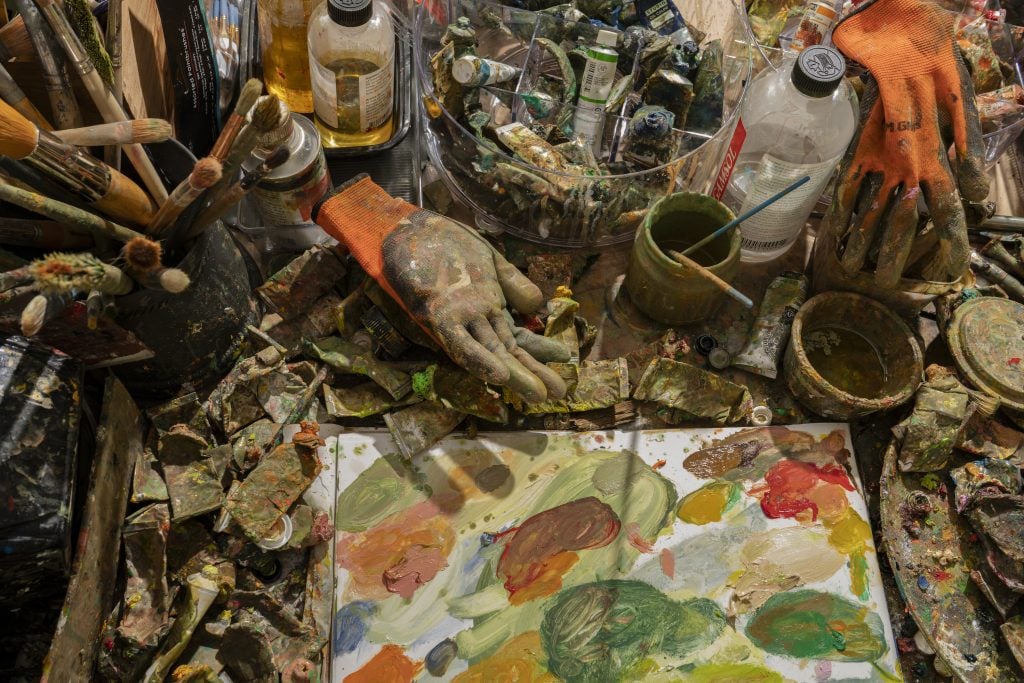
Soumaya Netrabile’s studio, 2023. Photo: Robert Chase Heishman.
What are you working on right now?
I’ve spent this whole year working on shows for this coming fall. The first one is in L.A. with Anat Ebgi and the second is in Seoul at Gana Art Center, and they’ll be very different shows. The Anat Ebgi show is about how walking leads to reverie. The paintings are explorations of how the physical act of wandering is tied to the mental activity of wandering. The Seoul show is more about my experience of immersing myself in a focused area, sitting and watching. One of the things I like to do in the woods is get on my knees, dig around, search for bugs and critters. There’s so much pleasure in sitting still and following insects through their meanderings. That experience of being in the undergrowth of the forest has directly informed a lot of the work in the Gana show.
What kind of atmosphere do you prefer when you work?
I listen to music all the time and what I put on depends on my mood. It’s been a lot of opera lately—The Marriage of Figaro, Rigoletto, The Barber of Seville. I think most of the Anat Ebgi show was painted while listening to opera. I’ve got a few artist friends from all over the world who send me music recommendations, which is so great because the range of tastes coming at me is pretty diverse. We’re all different ages and it’s interesting to hear what everyone else is listening to—everything from under-recognized punk groups to obscure experimental jazz. I can’t do audiobooks or podcasts. It’s difficult for me to concentrate on somebody speaking while I’m painting. Music is all I can have on in the background.
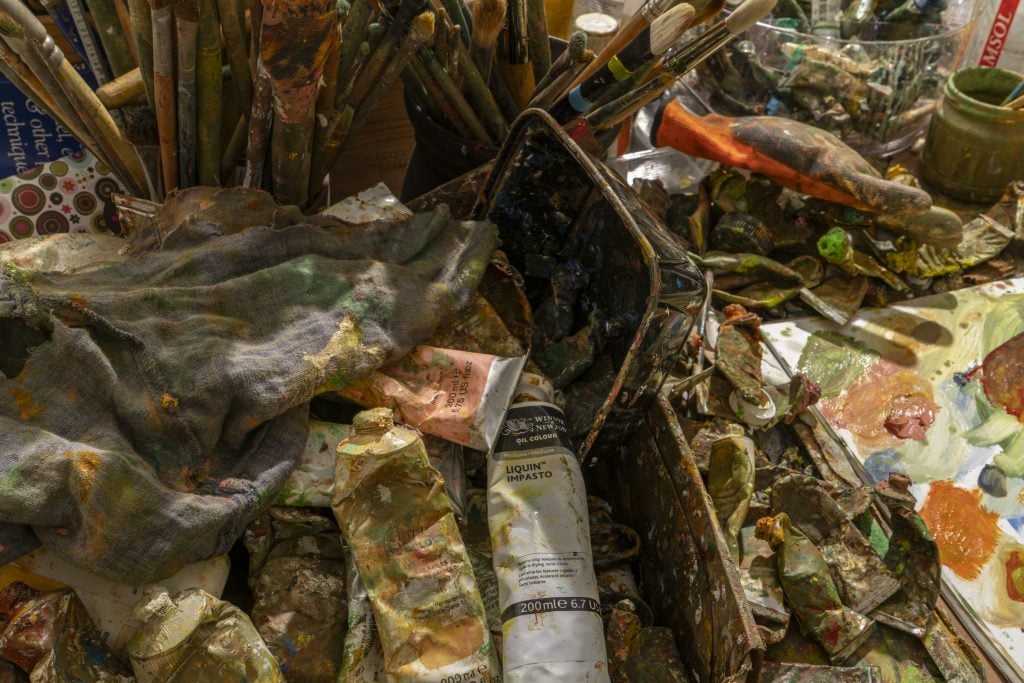
Soumya Netrabile’s studio (2023). Photography by Robert Chase Heishman.
What images or objects do you look at while you work? Do you have any other artist’s work in your studio?
I keep a lot of books in the studio, mostly essays and poetry. My constant companions are T.S. Eliot, Wendell Berry, Charles Wright and Clarice Lispector. Eliot has been a huge influence since I was teenager. I’m fascinated by how he constructs his verse and rhythms, and how his poems are held together. I see things that can be translated to paint.
What’s the last museum exhibition or gallery show you saw that really affected you and why?
The last show I really loved was “Strike Fast, Dance Lightly“ at the Flag Art Foundation. The show gave a fabulous range of ideas, all tied to boxing and fighting. I’m a fan of fighting sports. A family friend took me and his son to a boxing match when I was 15. We had seats in the second row, which allowed us to experience the match at a visceral level. Being able to hear and see everything, I got immediately pulled in. There’s a grandeur and mythology to boxing that has always attracted me. And at a deeper level, I have both a fascination and admiration for people who voluntarily put themselves in this situation of violence, because I don’t know if I have it in me to do it.
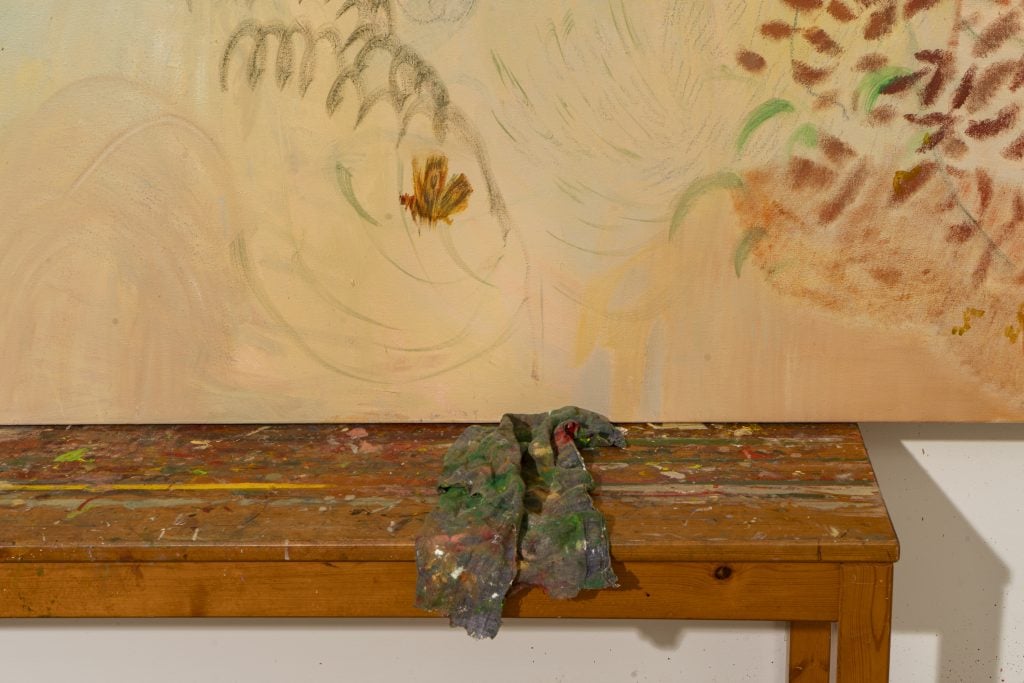
Soumya Netrabile’s studio (2023). Photography by Robert Chase Heishman.
Where do you get your food from, or what do you eat when you get hungry in the studio?
I try not to eat in the studio, because I’m a super messy painter, even with gloves on. If I have to eat, it’s instant soup or a banana—if I have to. I’m open to all types of food, though, and I love cooking.
What’s the last thing you do before you leave the studio at the end of the day (besides turning off the lights)?
But, before I turn off the lights, I will wash my brushes if I’m not feeling lazy. I also take photos of whatever I’ve been working on that day. When I get home, I have a cup of chai and go over the images, making mental notes. Sometimes I’ll move the images to my iPad and mess around with them on ProCreate. This helps if I left the studio frustrated or unhappy—to give me a way to get back in. I may physically leave the studio, but the studio doesn’t seem to leave me.
